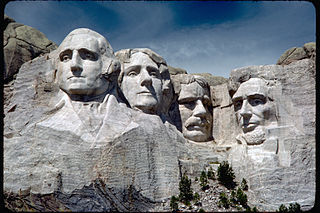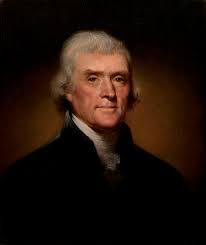Personality
Personality Profiles of Great American Presidents
Great presidents have been compassionate yet manipulative.
Posted December 23, 2015
What makes a president great? Some U.S. presidents have been acclaimed by historians for their greatness, while others have been seen as ineffective leaders. Undoubtedly, there are complex reasons for such wide divergence in the merits of different presidents. There is evidence indicating that at least some of the variation in presidential greatness can be linked to their individual personality traits. Looking at how personality traits are related to performance in the highest political office may provide a test of theories about how personality relates to social effectiveness in real life.

People who run for political office, especially for president, are scrutinized by the public to determine if they have the right character to be an effective leader. But what sort of character traits make a leader effective? There may be no one right answer, as leader effectiveness will depend to a great extent on the requirements of the circumstances in which they wield power. However, there may be certain characteristics that great leaders share in common. Examining historic leaders may provide some clues as to what these common characteristics might be. Additionally, such an examination might provide a test of theories about what set of traits makes a person socially effective. One such theory relates social effectiveness to a single underlying general factor of personality that combines many different traits in a socially desirable way (Dunkel & Van der Linden, 2014). According to this view, there is a continuum of personality traits ranging from one end that is adaptive, prosocial, and socially effective, while the opposite end is maladaptive, socially deviant, and likely to alienate a person from society. As I have explained in a number of previous posts (for example, here and here), proponents of the general factor of personality claim that it is the underlying basis of well-known, multi-factor models of personality, such as the Big Five. Hence, persons high in this general factor would combine high levels of extraversion, agreeableness, conscientiousness, and openness to experience, with low levels of neuroticism. If this theory is correct, then one might expect that presidents who have been rated as particularly effective by historians would generally show a pattern of being high in extraversion, agreeableness, conscientiousness, and openness to experience, and low in neuroticism, while less effective presidents would show a generally opposite, or at least different, pattern.
A number of studies have attempted to assess the personalities of U.S. presidents, living and dead. Assessing public figures, particularly those who are no longer alive, presents some difficulties, but they are not insurmountable. All the U.S. presidents have been intensively studied by historians, so it is possible to use detailed historical information to develop ratings of their personality traits. Additionally, presidential performance can be assessed against objective criteria, and rankings of presidents on their effectiveness based on expert consensus have already been published. One influential study (Rubenzer, Faschingbauer, & Ones, 2000) recruited expert biographers and asked them to provide ratings using personality tests for every president from Washington to Clinton. They were then able to assign each president a score on each of the Big Five factors. Additionally, each of the Big Five was subdivided into six narrower traits or facets, making a total of 30 facets rated for each president. The scoring system used was designed to allow comparisons with norms for the modern U.S. population, so that presidential trait scores could be compared to the average scores of ordinary people. Individual presidents varied enormously on every trait. Comparing the average of presidential traits to population norms, they found that presidents tended to be more extraverted and less agreeable and open to experience than most ordinary people. In regard to specific facets, presidents on average tended to be higher in achievement striving, assertiveness, and openness to feelings, and lower in openness to values, straightforwardness (honesty), and modesty. As the authors explained, presidents tend to be hard-working, able to get their own way, in touch with their emotions, conventional and traditional in their moral views, yet willing to take liberties with the truth and manipulate others, and also have a good opinion of themselves.
More importantly, they found that a number of these traits had substantial correlations with independently obtained ratings of presidential greatness, which were based on existing surveys of a very large number of presidential experts. The Big Five dimension with the largest correlation with presidential greatness was openness to experience, so that presidents who were more open to experience were generally considered greater than those who more closed. This makes sense, as another study found that ratings of presidential openness to experience were strongly correlated with ratings of their intellectual brilliance and their general intelligence (Simonton, 2006). Additionally, extraversion and conscientiousness had modest positive correlations, while agreeableness had a modest negative correlation with greatness. That is, great presidents tended to be somewhat more extraverted and conscientious, but also somewhat less agreeable. Neuroticism on the whole was unrelated to greatness. Please note that there are prominent exceptions to these patterns (e.g., Washington was rated as being low in openness to experience, yet he has been consistently rated very highly indeed on greatness). Nevertheless, these patterns apply more often than not.

There were also a number of significant correlations between greatness and the facet scores. The only neuroticism facet that was significant was vulnerability, with a negative correlation, indicating that presidents who coped well with stress and adversity tended to be greater. Among the extraversion facets, the strongest positive correlation was with assertiveness, followed by activity, positive emotions, and to a lesser extent excitement seeking. Interestingly, the warmth and sociability facets were unrelated to greatness, suggesting that one does not have to be a people person to be an effective president.
Among the openness facets, there were significant positive correlations for openness to feeling, aesthetics, actions, values, and ideas. This suggests that great presidents valued their emotions, were interested in art and culture, were willing to try new experiences, willing to go against tradition and challenge convention, and were intellectually sophisticated.
The pattern for the agreeableness facets showed an interesting mixture. There were negative correlations with straightforwardness and compliance, indicating that even great presidents were willing to bend the truth and manipulate people when it suited them, and they refused to follow rules or go along with the wishes of others when necessary. On the other hand, there was a positive correlation between greatness and tender-mindedness, indicating that great presidents genuinely cared about the suffering of the less fortunate.
In regards to conscientiousness facets, there were positive correlations with competence, achievement striving, and self-discipline, indicating that great presidents were sure of their abilities, worked hard to achieve their goals, and controlled their impulses. On the other hand, there was a small negative correlation with orderliness, suggesting that great presidents were not especially concerned with being neat and tidy and may have appreciated messiness.
Based on these results, traits that distinguish the greater from the lesser-regarded presidents are not a complete match for a general factor of personality. On the one hand, presidential greatness tends to be associated with higher openness to experience, extraversion, and conscientiousness, but also with lower agreeableness on the other. Looking at the facets of agreeableness is particularly interesting, as it suggests that presidents who were considered compassionate have been rated more greatly, yet those who were cooperative, compliant, and willing to go along with others have been less effective. Straightforwardness, which is basically a form of honesty, has a strikingly negative relationship with greatness, indicating that great presidents know when to be devious. Hence, while at least one aspect of agreeableness (tender-mindedness) is important for greatness, other aspects of agreeableness may be a hindrance. This might be because in order to be considered great, a leader needs to have a noble vision, yet in order to achieve their goals they also need to be tough and demanding, and possess political skills in manipulating people.
Additionally, certain facet traits appear to be unimportant for presidential greatness. For example, while sociability and warmth are important for close interpersonal relationships, they do not seem to make much difference to a president’s effectiveness. Also, while being low in neuroticism is clearly beneficial to one’s mental health, it appears that presidents who suffer from emotional and psychological problems can still be great leaders, as long as they can handle stress and adversity well. The best example of this is Abraham Lincoln, who was known to suffer severe bouts of depression and anxiety, yet has been widely acclaimed as the greatest American president of all time.

It has been argued that a general factor of personality represents a dimension of social effectiveness. In order to become a great president, a person surely must be socially effective, yet not all of the traits that make up the general factor are associated with presidential greatness, and some of them actually may interfere with a president’s effectiveness. Hence, presidents who have been regarded as great and effective have displayed a mixture of socially desirable and undesirable traits. This seems especially true in regards to the traits that compose agreeableness. While highly agreeable people are generally well-regarded and seen as good citizens, they may also be seen as overly submissive and easily taken advantage of. Hence, while it is important for leaders to care about people, at least some agreeable traits may get in the way of being a good leader. Another point is that while a general factor of personality is associated with good psychological adjustment (e.g., people high in this factor tend to have high self-esteem and be satisfied with their lives (Musek, 2007), being happy and well-adjusted may not be a necessity in a great leader. A leader’s role is to serve the people well, rather than to have a happy life. This might shed some light on the fact that traits associated with subjective well-being, such as sociability and most facets of neuroticism, were unrelated to presidential greatness.
There are of course limitations to looking at presidents for clues to social effectiveness. American presidents represent a sample of leaders from a highly individualistic Western democracy. Hopefully, future studies will examine the personality traits of leaders from other cultures, such as those that are more collectivistic and authoritarian, in order to shed more light on what traits distinguish effective leaders, and how this might depend on the cultural context.
Further reading
To view a list of previous posts (with links) I have written concerning the general factor of personality click here.
References
Dunkel, C. S., & Van der Linden, D. (2014). Evidence for the general factor of personality as social-effectiveness. Personality and Individual Differences, 64, 147-151. doi: http://dx.doi.org/10.1016/j.paid.2014.02.030
Musek, J. (2007). A general factor of personality: Evidence for the Big One in the five-factor model. Journal of Research in Personality, 41(6), 1213-1233.
Rubenzer, S. J., Faschingbauer, T. R., & Ones, D. S. (2000). Assessing the U.S. Presidents Using the Revised NEO Personality Inventory. Assessment, 7(4), 403-419. doi: 10.1177/107319110000700408
Simonton, D. K. (2006). Presidential IQ, Openness, Intellectual Brilliance, and Leadership: Estimates and Correlations for 42 U.S. Chief Executives. Political Psychology, 27(4), 511-526. doi: 10.1111/j.1467-9221.2006.00524.x




